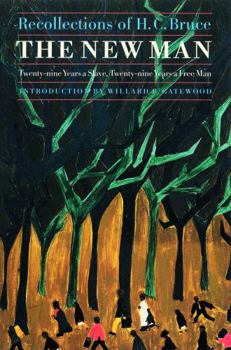The New Man: Twenty-Nine Years a Slave, Twenty-Nine Years a Free Man. Recollections of H. C. Bruce
Select Format
Select Condition 
Book Overview
Born to black slaves in 1836, H. C. Bruce took the name of his master, a farmer in Prince Edward County, Virginia. After years of slaving on the plantation in Missouri and working in tobacco factories, Bruce escaped to freedom in Kansas with his future wife. In the 1880s, he moved to the District of Columbia to take a federal job arranged by his brother, Blanche K. Bruce, a senator from Mississippi.
The New Man is unusual in its double perspective: for Bruce's life was split by servitude and freedom, and his experience gave heightened meaning to both. Bruce provides insights into the slave's attitudes toward his masters and toward poor white people. He believes that "good blood" (a sense of honor and duty and domestic virtues) will tell, no matter the race, but he appeals to fairness in assessing the situation of emancipated slaves at the end of the Civil War: "They were set free without a dollar, without a foot of land, and without the wherewithal to get the next meal even, and this too by a great Christian Nation."
Format:Paperback
Language:English
ISBN:0803261322
ISBN13:9780803261327
Release Date:September 1996
Publisher:Bison Books
Length:165 Pages
Weight:0.50 lbs.
Dimensions:0.5" x 5.3" x 8.0"
Related Subjects
Africa African-American & Black African-American Studies Asia Biographical Biographies Biographies & History Biography & History Civil War Ethnic & National History Midwest Military Modern (16th-21st Centuries) Politics & Social Sciences Regional U.S. Slavery & Emancipation Social Science Social Sciences Specific Demographics State & Local United States Civil War WorldCustomer Reviews
1 rating
Unique and Interesting Perspective
Published by Thriftbooks.com User , 21 years ago
This book was very interesting. Offered new insight into the life of a slave and in a region not known for large slave population, Missouri. Quick read, too.






